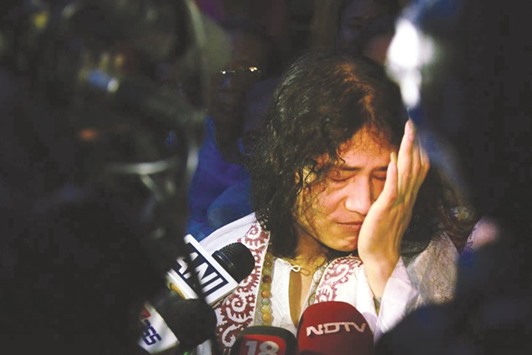Human rights campaigner Irom Sharmila announced yesterday she will end her 16-year-long hunger strike to focus on contesting upcoming elections in Manipur.
Sharmila, known as the ‘Iron Lady’ of Manipur for her unwavering and non-violent protest against rights abuses in the northeast region, said she would break her fast on August 9.
Sharmila has been kept in judicial custody almost since she began fasting in 2000 to back her demand for the withdrawal of special powers wielded by security forces in the insurgency-wracked region.
She has been confined to a hospital ward in Manipur’s main city Imphal on criminal charges of attempted suicide – and is force fed via a plastic nasal drip several times a day.
“I have decided to end my 16-year fast on August 9 and contest the 2017 state elections as an independent candidate,” the 44-year-old said outside a magistrate’s court in Imphal.
“My fight so far has been all alone and so I have decided to wage a war against the act democratically by becoming a lawmaker instead of continuing with my fast,” she said. She also told the court – where she is required to mark attendance every 15 days – that she wants to marry.
Sharmila stopped eating and drinking after allegedly witnessing the army kill 10 people at a bus stop near her home in Manipur, which is subject to the Armed Forces Special Powers Act (AFSPA).
The act, which covers large parts of the northeast and Jammu and Kashmir, gives security forces sweeping powers to search, enter property and shoot on sight, and is seen by critics as a cover for human rights abuses.
The government says security forces need the powers to help them battle multiple rebel groups whose long-standing demands range from secession to greater autonomy and land rights.
Sharmila has often been released from custody after appearing in court flanked by police - only to be re-arrested almost immediately on fresh charges of trying to kill herself.
The maximum punishment for attempting suicide is one year in prison.
In 2014, she pulled off the nasal tube after being released on orders from a court, which said there was no evidence that she was trying to commit suicide by refusing food.
She also declined an offer from the Aam Aadmi Party to be its candidate for the national election that year.
Two years on, the announcement has left her supporters surprised.
“We are trying to speak to her to get a sense of how she wants to take struggle forward. Of course if she wants to end her fast, it is totally her prerogative but it is also important to carry the struggle forward,” said Babloo Loitongbam, an activist and close associate.
Babie Shirin, a student at an Imphal college, said: “If Sharmila enters politics and crusades against AFSPA, it will be much more effective. The fast has gone on for too long and hasn’t had the desired effect.”
Sharmila’s brother, Singhajit, said her family backed her new fight.
“Whatever she does we will support her as a family. Even our mother is hoping for the day when the Act is abolished and Sharmila wins the cause she has been fighting for,” Singhajit said.
Media reports suggest that the central government was having ‘back channel’ talks with Sharmila, trying to persuade her to end her fast.
Manipur will hold assembly elections in 2017.
Born in 1972, she is the youngest of nine siblings who grew up in Manipur.
She gave up her dreams of becoming a doctor and decided to fight against the human rights violation in Manipur.

Sharmila: wants to get married and stand for election
